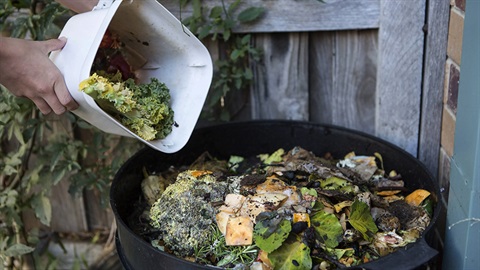Composting, bokashi, worm farms and keeping chickens

Compost bins, worm farms, bokashi bins and keeping chickens are great ways to recycle your food waste. Food waste is a large contributor to landfill and greenhouse gas emissions, and these projects will ensure you're making the most out of your scraps.
Compost bins
Compost bins are a good choice for people with more space; however, they do require maintenance. Material in compost bins should be turned regularly to maintain air flow, because this helps the micro-organisms to break the material down faster.
Compost requires a balance of inputs to ensure the organic matter breaks down. It needs a balance of:
- Carbon - dry leaves, straw, paper, sawdust, shredded branches, dry grass
- Nitrogen - food scraps, fresh grass, manures, blood and bone, seaweed, comfrey, lucerne
- Oxygen - introduced by turning the heap once a week while the material is new
- Water - to keep the heap moist and covered
- Correctly sized particles and heap- small particles, large heap
Compost bins are available in a range of shapes and sizes from hardware stores.
Further information on composting:
Bokashi bins
Bokashi bins are ideal for small apartments or units, as they can be kept inside. Bokashi bins can handle small volumes of kitchen waste, including food waste like meat and dairy. The system uses a process of fermentation, aided by the bokashi mix or enzyme, which is sprinkled over layers of kitchen scraps.
The end products are bokashi juice and solid bokashi waste. Bokashi juice can be diluted and added to your garden or indoor pot plants. The solid bokashi waste can be buried in your garden or added to a conventional compost heap, where it will break down completely. If you don't have access to a garden, that's okay! Many community gardens are happy to accept this solid waste for their own compost heaps.
Check with your closest community garden or visit Peels to find a compost heap near you.
Bokashi bins are available in a range of shapes and sizes from hardware stores or online.
Worm farms
Worm farms are a great option for people with smaller yards or balconies; you can produce rich soil (castings) and liquid fertiliser (worm juice) in a small area. Worm farming uses selected worms (typically Tiger Worms, Red Wrigglers and Indian Blues) to break down kitchen and garden scraps.
Tips
- Choose a cool shaded spot for your worm farm
- Add composting worms, such as Tigers, Reds and Blues, as they live, work and breed well in the rich, moist, organic environment
- Keep your worm farm moist, warm and protected from the hot summer sun
- If possible, shred kitchen and garden waste into smaller pieces
- Cover the worms with a small black plastic sheet in cool weather - in hot weather a damped hessian, newspaper is more desirable
- Always replace the lid
- Castings can be placed in the garden around plants, in pot plants, around fruit trees, native trees and vegetables
Coffee grounds are a source of nitrogen and a great addition to your compost. Add together with your kitchen scraps and make sure you layer with about one third carbon-based materials, such as dried leaves or untreated wood shavings. Coffee grounds make good worm food, and some people like to add coffee grounds directly to their garden as fertiliser. They can also be sprinkled around seedlings to deter slugs and snails.
Worms and worm farms are available in a range of shapes and sizes from hardware stores or online.
Food and green waste bins
If you don't have the time or space to compost your food scraps, you can place them in your light-green lidded food and green waste bin. You can use this bin to compost items like meat, bones, seafood, citrus, bread and more.
Find out more about how to use food and green waste bins.
Keeping chickens
Backyard chicken keeping is a great way to get a regular source of organic, happy eggs - plus chickens can make great pets!
Check out this video about chicken keeping:
Keeping Healthy Happy Chooks with Jessamy Miller video
Backyard chooks and lead contamination
Recent studies found high levels of lead in backyard chickens and eggs in our biggest cities, and Darebin was flagged as at higher risk. Older homes can contain lead contamination from the historical use of lead-based paints, leaded petrol and lead pipes. Lead gets into the hens as they scratch in the dirt and peck food from the ground. But there are things you can do to keep yourself and your chickens safe:
- Get your soil tested - check out Macquarie University’s VegeSafe program
- Areas of soil identified as a problem can be replaced and/or chickens kept to areas of known clean soil
- Purchase free-range organic, pastured or regeneratively produced eggs, if you can't safely keep chickens on your property